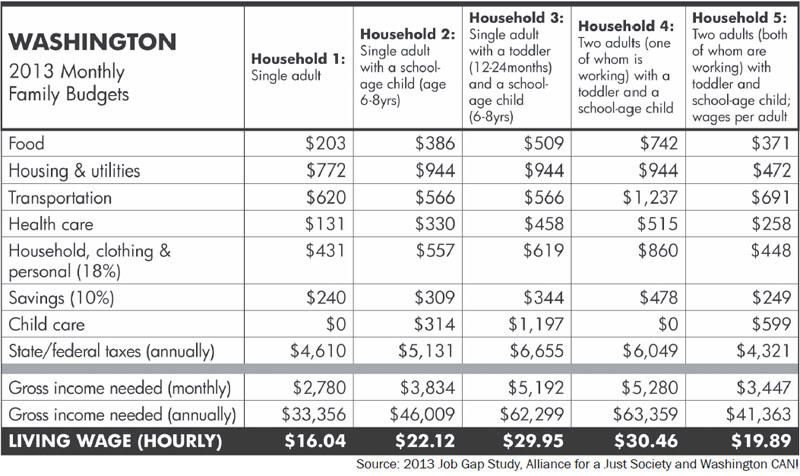OPINION
Boosting minimum wage rewards work, protects taxpayer
OLYMPIA (Feb. 7, 2014) — “You know what it means when they pay you minimum wage?” comedian Chris Rock asks. “You know what they’re trying to tell you? ‘Hey, if I could pay you less, I would. But it’s against the law’.”
So why do we have a law setting the lowest legal wage? It’s because, in America, we believe that people who work hard and play by the rules should be able to afford a decent standard of living. If you work a full-time job, you shouldn’t be forced to live in poverty.
That was the message of the 1998 initiative campaign to make Washington the first state to automatically adjust its minimum wage for the rising cost of living. Opponents made their usual doomsday predictions of job losses and businesses moving across state lines, but voters approved it by a two-thirds majority, passing it in every single county.
And it has served us well. While inflation has eroded the value of other states’ minimum wages, Washington’s lowest-paid workers have earned more and spent more in their communities, creating a virtuous cycle for other workers and businesses. The doomsday predictions proved false. (See great articles here and here.) Our state unemployment rate is lower than the national average. Retail, restaurant, hospitality, and other minimum-wage jobs have increased at rates similar to other sectors.
But at $9.32 an hour, Washington’s minimum wage is still less than $20,000 a year for a full-time worker. Is that enough to assure “the maintenance of the minimum standard of living necessary for health, efficiency, and general well-being of workers,” the law’s stated goal?
The 2013 Job Gap Study found that a single adult in Washington needs to earn more than $16 an hour to meet basic needs for food, housing, transportation, health care, and other non-discretionary expenses.
And yes, we’re talking about adults. As America’s economy has changed, more adults are employed at or near the minimum wage. A 2013 study by the Economic Policy Institute found that 88% of workers that would be affected by a federal minimum wage increase are 20 years old or older, more than a third of them are over 40, and 56 percent are women. The study also found that the majority of minimum wage earners work full time.
What happens when people work but still can’t afford to meet their basic needs? We all pay the price.
All individuals and businesses pay higher taxes, in effect, to subsidize the companies that pay the lowest wages. Our society created safety nets intended to provide temporary help to the poorest among us and those who have fallen on hard times. But increasingly, it is the working poor who visit food banks, seek housing assistance, and apply for Medicaid — even though they have a job, or multiple jobs.
Those safety nets are struggling under the weight of the working poor. State lawmakers face increasingly hard choices every year about how to maintain them while also funding our schools, roads, public safety, and other critical functions of state government.
The good news is that policymakers in both Washingtons have turned their attention to income inequality and its consequences. President Obama, frustrated by Congressional gridlock, just announced plans to raise the minimum wage for federal contractors to $10.10. In our state, as often happens, cities are leading the way by raising their minimum wages to as high as $15, as voters did in SeaTac and city leaders plan to do in Seattle.
 In the Washington State Legislature, 33 Democratic state representatives are sponsoring HB 2672 to raise our state minimum wage in three steps to $12 an hour by 2017 and then to continue annual adjustments. Our minimum wage is already on pace to exceed $10 an hour by 2017, so the actual net increase of HB 2672, which is prime-sponsored by Rep. Jessyn Farrell (D-Seattle), would be less than $2 an hour over three years.
In the Washington State Legislature, 33 Democratic state representatives are sponsoring HB 2672 to raise our state minimum wage in three steps to $12 an hour by 2017 and then to continue annual adjustments. Our minimum wage is already on pace to exceed $10 an hour by 2017, so the actual net increase of HB 2672, which is prime-sponsored by Rep. Jessyn Farrell (D-Seattle), would be less than $2 an hour over three years.
Once again, opponents of minimum wage increases are predicting dire consequences for our state and ignoring the benefits of working families earning higher wages. In fact, some Republicans in Olympia have proposed legislation that moves us in the opposite direction by lowering the minimum wage for young adults or new employees, or by ending the voter-approved annual adjustments.
Washington should choose the path of promoting fundamental economic fairness. Extra money in people’s pockets will boost our state economy and it will relieve some of the pressure on those taxpayer-funded safety nets.
HB 2672 rewards an honest day’s work with a fair wage, and it protects taxpayers from having to subsidizing the fast-food and other businesses that pay wages so low that they should be against the law.
David Groves is the Editor of the Stand. He can be reached at david.groves@thestand.org.







